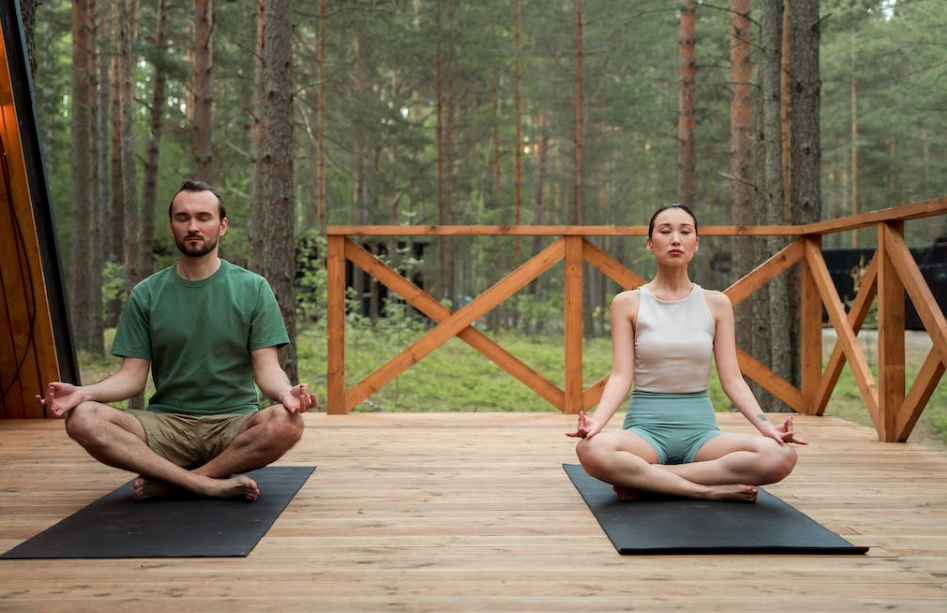Meditation Vs Napping
Learn the difference between meditation and napping and how to apply it in your life.

Selfpause Affirmation App
Download the app to get 1,000’s of affirmation meditations and everything you need to write, record and listen to your own.
In this article, we will look at the benefits of napping and meditation. We will learn about the two types of sleep, the effect they have on our brain waves, and their health benefits. Ultimately, you will be able to decide which is right for you. Whichever method you choose, be sure to practice it with patience and understanding.
Meditating

Meditating, unlike napping, can improve your performance. A recent Norwegian study found that experienced meditators’ brains had more alpha and theta waves. This indicates that they were more relaxed. In contrast, the brains of people who were sleeping were more likely to be in the delta wave state.
While napping and meditation are both great ways to rest, napping has many health benefits. For example, it can improve mood and reduce inflammation and pain. Studies show that a 20 to thirty-minute nap is best, while longer ones can result in a deeper sleep. Also, naps can be good ways to cure insomnia.
If you want to meditate, it is best to find a quiet and peaceful place. You can also meditate anywhere, even in your car. You can also do it while you’re waiting for something to happen, such as the doctor’s office. In addition, meditation can help relieve stress and give you clearer thinking.
Studies show that meditation helps boost your mood and helps you perform better during the day. It can also help relieve anxiety and depression caused by lack of sleep. While meditating isn’t as relaxing as napping, it can make you feel more alert and relaxed. Even a few minutes a day of meditation can have a beneficial effect on your mood and productivity.
While meditation has several benefits, few of these have been tested in controlled studies. Some researchers report increased performance and decreased need for sleep. These benefits have been studied in some controlled studies. One primary study measured reaction times of people after a 40-minute nap and meditation. Interestingly, the results of the study showed that meditation improved reaction time.
The study also found that novice meditators were more alert after 40 minutes of meditation compared to those who had a nap. In addition, the number of lapses decreased both in individuals and in the group, which indicated an improvement in alertness levels worldwide. Further, experienced meditators were able to meditate for up to 2.3 hours a day.
Meditation can replace sleep, but it’s only effective up to a certain point. While the average person needs about seven to eight hours of sleep a day, a half-hour of meditation per day will improve performance and productivity. For longer-term meditators, it’s safe to go below this.
Napping

Meditation and napping are two common ways of replenishing energy and promoting well-being. Each has its advantages and disadvantages. While naps give you an opportunity to relax, meditation helps you focus and refresh your mind. It helps you to become more productive. Moreover, it helps you achieve your goals by increasing your energy levels. However, the decision to choose one or the other depends on personal experience. Both methods help you to feel rejuvenated immediately after practicing them.
Although napping is easier than meditation, it may not be the best way to reduce your stress levels. However, it can help you achieve a more relaxed state and improve your health in many other ways. For example, napping can reduce your blood pressure and inflammation. It can also boost your immune system. Moreover, a nap can partially offset your sleep debt. But if your sleep debt is huge, you may be better off combining napping and meditation.
In addition to increasing mental capacity, a ten-minute meditation session can help you reduce stress, which is a great thing for your work. Besides, it can also help you achieve mental clarity, which is crucial for coming up with great ideas. Moreover, you can also do meditation at work and avoid the distractions associated with the traditional work schedule.
The ideal time to nap varies for every individual. However, it is recommended that you nap before the “post-lunch slump” and between 12:30 and 2 p.m. Otherwise, you may end up disrupting your circadian rhythms, leading to a poor night sleep. Moreover, if you work in the night or shift, you should take a nap earlier to avoid disrupting your sleeping pattern.
If you want to experience a deep state of relaxation, try a nap meditation. Napping meditations encourage deep breathing and relax the mind. These techniques should last for five to twenty minutes. When combined, they can help you to fall asleep faster and improve your health. It will make you more relaxed and improve your sleep.
Effects on brain waves

A new study shows that meditation affects brain waves differently than a nap. Researchers found that the LTM group experienced significantly higher levels of gamma brain waves, which are associated with enhanced compassion and optimal brain function. The study’s results were published in the August 2013 issue of the scientific journal PLOS ONE. Meditation is a form of relaxation that is not a substitute for a nap, and it can also help reduce stress.
A nap is an effective way to get a good night’s rest and boost energy. It has been used for thousands of years by people from different cultures to reset the central nervous system, reduce cortisol and blood pressure, and boost the immune system. A nap can help offset sleep debt, but is not a substitute for meditation. The naps are better suited for those with a large sleep debt.
While napping and meditation produce different types of brain waves, both are highly effective at relaxing the mind. A nap and meditation both increase alpha and theta brain waves, which are associated with a relaxed, creative state. But, while napping, the beta waves tend to decline.
Meditation, on the other hand, is associated with a lower level of lactic acid, which is associated with anxiety. However, it is not known if meditation causes sleep inertia. It is worth noting that meditation is an effective treatment for insomnia. Studies have shown that it improves sleep quality and length of time.
The benefits of meditation are numerous, but only a few have been confirmed in controlled studies. Other benefits of meditation include a reduced need for sleep and improved performance. In a primary study, meditation participants showed improved reaction time compared to non-meditators. The sleep duration of experienced meditators was significantly shorter than those of non-meditators and general population norms.
Health benefits

Meditation vs napping has many benefits for both you and your body. It can help you relax, replenish your energy, and reduce stress. It also increases your brain’s serotonin levels, which boosts your mood. Moreover, it lowers blood pressure and boosts your immune system.
If you’re battling the midday slump, consider meditating. According to two neuroscientists at the University of Kentucky, meditation can make you alert and refreshed. It also improves your memory. But before you decide between meditation and napping, be sure to know your limits.
Meditation is a conscious practice that allows you to relax and focus on your breathing. It can improve your concentration, memory, creativity, and multitasking skills. While a single meditation session is not enough to notice these benefits, consistent practice can lead to significant improvements in energy and mood. However, it cannot replace sleep, which is necessary for good health.
Meditation is a great way to relieve stress and boost your overall health. It can also help you sleep better at night. Studies show that it can enhance the immune system and reduce inflammation. However, it can be difficult to find time in your schedule to meditate. For this reason, it is important to create an environment that will be conducive to meditation.
Studies have shown that meditation improves the body’s ability to cope with stress. Regular meditation can also improve the way we perceive pain. Regular meditators are less likely to suffer from high blood pressure, which can cause heart attacks. It reduces blood pressure by reducing the stress on the heart.
However, taking a nap can cause you to become groggy the next morning. It can also alter your sleep cycle and impair your ability to function at work. Studies have also shown that power naps lasting more than 20 minutes have been linked to increased cardiovascular risks, decreased cognitive function, and increased mortality.
Meditation has many benefits and can help improve your mental health, boost your concentration, and increase your immune system. However, it should be short, and should be taken no more than twenty minutes a day.
Our Top FAQ's
Meditation and napping are two different practices that have some similarities and differences. Meditation typically involves focusing the mind on a specific object, thought, or activity to improve concentration and awareness, while napping is a short period of sleep during the day. Both practices can be used for relaxation and stress reduction, but meditation typically requires more mental effort and focus than napping.
The choice between meditating and napping for relaxation and stress reduction will depend on the individual and their needs. Meditation can be a more active and mindful practice that can help to cultivate a sense of calm and inner peace, while napping can be a more passive and restful activity that can help to refresh the mind and body. Both practices have their own benefits and drawbacks, so it may be best to try both and see which one works best for you.
It is possible to combine meditation and napping in a single session, although this may require some planning and preparation. For example, you could start with a short meditation session to calm the mind and prepare for sleep, and then transition into a nap by lying down in a comfortable position and allowing yourself to drift off. Alternatively, you could practice a form of meditation that involves a relaxed and restful state, such as yoga nidra or mindfulness-based sleep meditation, which can be used to induce sleep.
Regularly practicing meditation or napping can have potential negative effects if not done properly or if it interferes with other important activities or responsibilities. For example, if you nap for too long or at the wrong time of day, it can disrupt your sleep patterns and make it harder to fall asleep at night. Similarly, if you meditate for too long or in a way that causes discomfort or distress, it can lead to fatigue or other negative effects. It is important to be mindful of these potential drawbacks and to balance your meditation and napping practices with other healthy habits and activities.
Meditation and napping can be helpful for relaxation and stress reduction, but they are not a replacement for a good night’s sleep. While a short nap or meditation session can provide some temporary benefits, it is not a substitute for the restorative effects of a full night of sleep. In fact, regularly relying on meditation or napping instead of sleeping can lead to chronic sleep deprivation and other negative health effects. It is important to prioritize and maintain a healthy sleep routine in addition to practicing meditation and napping.
